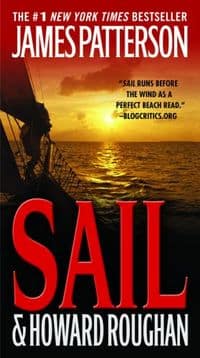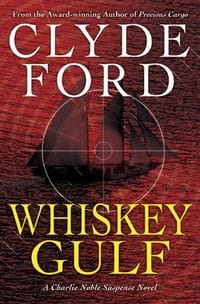 Over the summer I read a couple of sailing-related novels Sail by James Patterson (& Howard Roughan) and Whiskey Gulf by Clyde Ford. I am an avid reader of books on sailing with bookshelf chock full of the damned things (and the spines are broken on all of them in case you are wondering if I have read any of them).
Over the summer I read a couple of sailing-related novels Sail by James Patterson (& Howard Roughan) and Whiskey Gulf by Clyde Ford. I am an avid reader of books on sailing with bookshelf chock full of the damned things (and the spines are broken on all of them in case you are wondering if I have read any of them).
Other than the Patrick O’Brian Aubrey/Maturin series they are all factual accounts of sailing adventures, life under sail, sailing disasters or how-to books. The quality of writing is pretty variable from the great yarns but dodgy writing of the late great Tristran Jones to the fine factual storytelling of John Rousmaniere.
I picked up a paperback of Sail at an airport and it was a great way of getting through an endless delay, followed by a bumpy flight. I finished it in two sittings and as I am a slow reader in general, I must have found it compelling. It’s written like a fast-paced action movie. Light on character development, narrative but heavy of explosions. On balance it was a bit like eating a Big Mac. You can’t resist it. It’s delicious when you eat it but it’s not good for you. Frankly it’s been a month or so since I read it and I can’t remember the story coherently.
Part of Sail takes place on a Morris yacht and features a voyage from Newport to the Caribbean. The bits about sailing weren’t wrong just annoyingly shallow and incidental. It will not be joining the rest of my sailing book collection.
Whiskey Gulf was sent to me the publisher, I suspect in the hopes that I would give it a plug. I am hereby giving it a plug so thanks for sending me the book.
Whiskey Gulf started in promising fashion. It’s set in the Pacific Northwest. The hero, Charlie Noble, is a former Coast Guard Intelligence agent with an exciting past. He lives on pretty cool sailboat and seems to have a pretty sweet laid-back life. Charlie is summoned into action by a local sailing club when a couple of members go missing on a cruise near the Canadian border.
The couple had been sailing in an area where the US and Canadian navies were testing torpedoes and it was  believed their boat may have been struck by one. What then unfolds is a complex story of international incidents, terrorism, counter-terrorism and skunkworks featuring a conflicted love story and a mystical native American former navy seal.
believed their boat may have been struck by one. What then unfolds is a complex story of international incidents, terrorism, counter-terrorism and skunkworks featuring a conflicted love story and a mystical native American former navy seal.
The boating and sailing bits are very good. Clyde Ford knows his stuff and did his research. He weaved in quite technical nautical bits that give the tale a lot more credibility IMHO than Sail. Frankly, that’s the part of Whiskey Gulf I liked the best.
Other than that, it gets a passing grade. The story is far-fetched and tortuous and it drags on a bit. Candidly by the time I got to the end I had sort of lost interest.
It will join my sailing book collection but with a guarded approval rating.
I am still struggling to find some really good sailing fiction (other than Patrick O’Brian). Right now I still find factual accounts more enjoyable than fiction.
Suggestions anyone?

You and I came to about the same conclusion after reading “Sail” by Patterson.
I said: “overall, I’d say the book was pretty decent, and pretty typical for James Patterson’s style of work – I read it quickly and enjoyed the plot and the characters. but, I was also disappointed that the book really hardly touched on anything sailing other than to describe the boat.”
Here’s my full review:
http://my2fish.wordpress.com/2009/09/07/book-review-sail-by-james-patterson/
Surely, you’bve read at least SOME of Tristan Jones? He was a colorful, fellow Welschman with plenty to say. With 20 or so wonderful accounts blending equal amounts of sailing reality with a story tellers imagination, they are among the best. If you have not started, grab a copy of “A Steady Trade” and then plan on buying the rest later.
Think I’ll give “Sail” a miss based on what you say about it.
Sailing fiction – apart from 19th century stuff – isn’t that thick on the ground though you could give The Storm Prophet by Hector MacDonald a go.
Tristan Jones is definitely a good read, though non-fiction of course. I really enjoyed Over The Edge of the World about Magellan which read recently.
Both reviews should be somewhere under:
http://captainjpslog.blogspot.com/search/label/Books
Tristan Jones is non-fiction? I thought some people said his books quite a bit of both, grin!
How do you like all the rest of the Napoleonic-era historical fiction writers such as Dudley Pope (Ramage Touch), Bernard Cornwell (Sharpe’s Rifles), James L. Nelson (Revolution at Sea), and of course the original C S Forester (Horatio Hornblower)?
A suggestion:
“Celtic Ring” by Bjorn Larsson
James Patterson is definitely NOT great literature, but his books are perfect for the environs in which you found this one — in an airport where people are looking for relatively mindless reading to pass the time. I did rather much enjoy the book, only slightly annoyed by the inconsistencies and implausibilities.
Something to watch out for with Patterson is the co-writers; I’m sure they do most of the work, since otherwise he would have trouble cranking out a gazillion books a year. Howard Roughan and Maxine Paetro are good; some of the others are not.
If you haven’t discovered Robert Macomber yet, I’m pleased to introduce you to him!
Real sailing, (almost)real historical fiction!
http://www.robertmacomber.com/